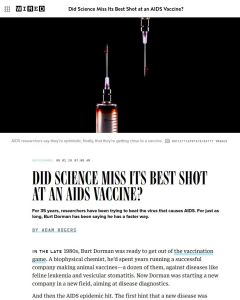Join getAbstract to access the summary!

Join getAbstract to access the summary!
Adam Rogers
Did Science Miss Its Best Shot at an AIDS Vaccine?
For 35 years, researchers have been trying to beat the virus that causes AIDS. For just as long, Burt Dorman has been saying he has a faster way.
Wired, 2018
What's inside?
Rational drug design has not yielded an HIV vaccine. Maybe old-fashioned trial and error would have done it.
Recommendation
In classical vaccinology, researchers don’t need to know how a vaccine works, just that it works. Burt Dorman had made a dozen effective vaccines. When the AIDS crisis hit, he wanted to get to work on an HIV vaccine. But science had moved to a more rational, hypothesis driven paradigm, and HIV is fundamentally different from other pathogens. So funders never gave him a chance. Thirty-five years and 35 million deaths into the epidemic they still haven’t. The article will fascinate those interested in the behind-the-scenes story of how, and why, science gets done the way it does – and how much that matters.
Summary
About the Author
Adam Rogers is the Deputy Editor at Wired magazine, where he’s covered natural disasters, biotechnology, physics, and science fiction. He also wrote Proof: The Science of Booze.

















Comment on this summary